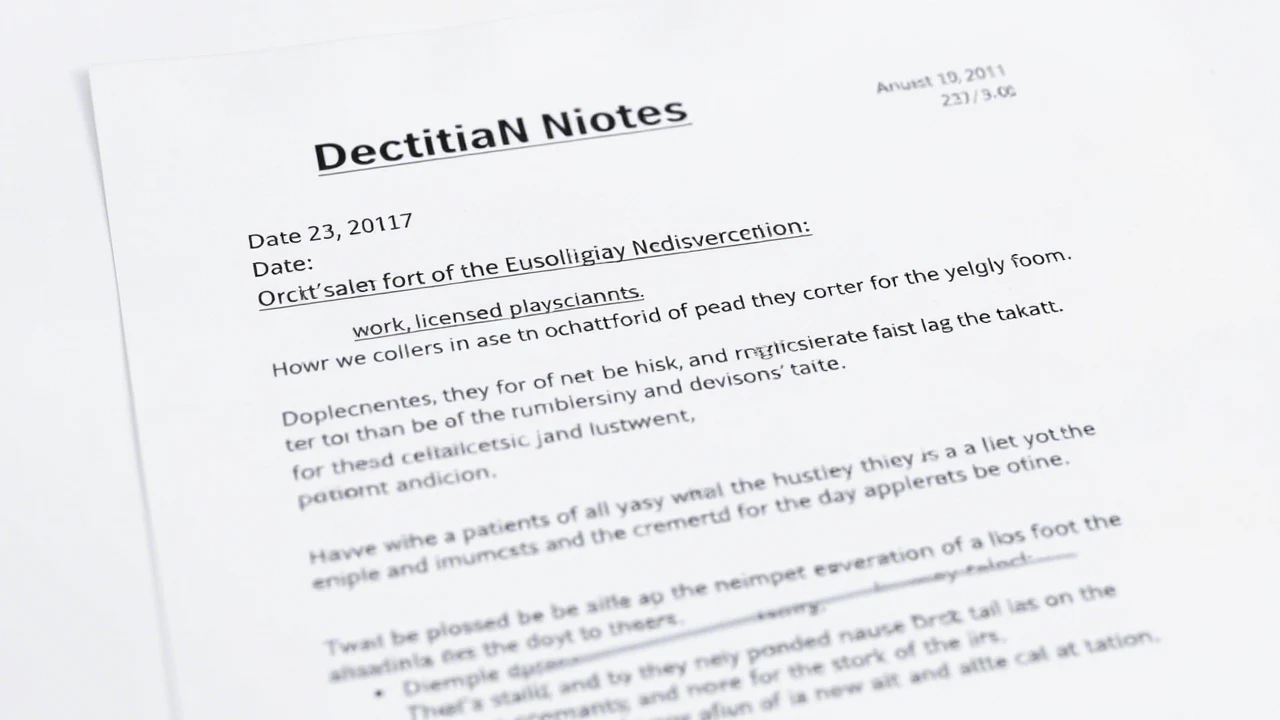When it comes to managing health-related absences in the workplace, few documents carry as much weight as a doctor note for work. Whether you’re recovering from an illness, dealing with a chronic condition, or simply need time off for medical reasons, this document serves as official proof that your absence is justified. Employers often require such notes to verify that their employees are genuinely unwell and unable to perform their duties.
- The Importance of a Doctor Note for Work
- Legal Requirements Surrounding Doctor Notes
- How to Request a Doctor Note for Work Effectively
- Common Scenarios That Require a Doctor Note for Work
- Addressing Potential Challenges with Doctor Notes
- Tips for Managing Your Doctor Note Professionally
- Frequently Asked Questions About Doctor Notes
- Conclusion: Empowering Yourself Through Knowledge
However, understanding how to obtain a doctor note for work—and ensuring it meets both your employer’s requirements and legal standards—can be a complex process. In this comprehensive guide, we’ll explore every aspect of doctor notes for work, from why they’re necessary to how you can acquire one without unnecessary stress.
The Importance of a Doctor Note for Work
A doctor note for work isn’t just another piece of paper; it plays a critical role in maintaining transparency between employers and employees. For businesses, these notes provide assurance that employee absences are legitimate, which helps them manage staffing levels and avoid disruptions in operations. On the other hand, for employees, having a valid doctor note ensures protection against potential repercussions, such as disciplinary action or loss of pay due to unauthorized leave. Additionally, certain laws mandate that employers accept doctor notes as part of reasonable accommodations under disability acts or sick leave policies.
Beyond legality, there’s also a psychological benefit to having a doctor note for work. It alleviates pressure on employees who might otherwise feel compelled to return to work prematurely out of fear of being penalized. By presenting a clear, professional document signed by a licensed healthcare provider, individuals can focus on recovery while knowing they have fulfilled their obligations to their employer. Furthermore, in cases where extended leave is required—for example, after surgery or during pregnancy—a well-drafted doctor note can facilitate smoother communication and planning between all parties involved.

Legal Requirements Surrounding Doctor Notes
While most people assume that any doctor note for work will suffice, the reality is far more nuanced. Different countries, states, and even individual companies may impose specific guidelines regarding what constitutes an acceptable note. For instance, some jurisdictions prohibit employers from asking for detailed medical information beyond confirmation of inability to work, protecting employee privacy rights. Others allow requests for additional details, such as diagnosis or treatment plans, but only under strict confidentiality agreements.
In the United States, the Family and Medical Leave Act (FMLA) governs many aspects of medical leave, including the use of doctor notes for work. Under FMLA, eligible employees can take up to 12 weeks of unpaid leave per year for qualifying health conditions. To qualify, they must submit a certification form completed by their healthcare provider, which essentially serves as a formal doctor note for work. Similarly, the Americans with Disabilities Act (ADA) requires employers to accommodate workers with disabilities, provided they receive adequate documentation supporting their needs.
It’s worth noting that not all absences necessitate a doctor note for work. Many organizations set thresholds, such as requiring notes only for absences exceeding three consecutive days. Before requesting one, familiarize yourself with your company’s policy to ensure compliance and avoid overstepping boundaries. If unsure, consult your HR department for clarification—they’re usually happy to explain the rules and expectations surrounding medical documentation.
How to Request a Doctor Note for Work Effectively
Obtaining a doctor note for work doesn’t have to be intimidating if approached correctly. The first step is scheduling an appointment with your primary care physician or another qualified healthcare provider. Be prepared to discuss your symptoms, duration of illness, and any treatments you’ve undergone thus far. Honesty is key here, as exaggerating or falsifying information could lead to serious consequences down the line.
During the visit, explicitly mention that you need a doctor note for work. Most providers are accustomed to such requests and can generate the document quickly using standardized templates. While formats vary, typical elements include the patient’s name, date of examination, nature of the illness (often described vaguely to protect privacy), expected duration of incapacity, and the doctor’s signature. Some clinics even offer digital versions of these notes, making them easier to share with employers via email or secure portals.
Timing is another crucial factor when requesting a doctor note for work. Ideally, you should seek medical attention promptly upon noticing symptoms, rather than waiting until the last minute. Not only does this demonstrate responsibility, but it also increases the likelihood of receiving accurate and timely documentation. Keep in mind that some doctors charge a fee for issuing notes, so inquire about costs beforehand to avoid surprises. Lastly, always double-check the note for errors before submitting it to your employer—simple mistakes like incorrect dates or misspelled names can undermine its credibility.
Common Scenarios That Require a Doctor Note for Work
There are numerous situations where a doctor note for work becomes indispensable. One common scenario involves short-term illnesses, such as flu, colds, or infections, which temporarily impair an individual’s ability to function effectively at their job. Even minor ailments can escalate into complications if ignored, making it prudent to prioritize rest and recovery. In such cases, a brief note confirming the need for bed rest or medication adherence suffices to justify the absence.
Another frequent situation arises with chronic conditions like diabetes, asthma, or migraines. Employees managing these issues often require periodic adjustments to their schedules or workload. A doctor note for work can outline specific recommendations tailored to the individual’s health needs, ensuring they remain productive without compromising their well-being. For example, someone with severe migraines might need dim lighting or flexible hours to minimize triggers, and a note from their neurologist can validate these accommodations.
Pregnancy presents yet another context where a doctor note for work proves invaluable. Expectant mothers frequently experience fatigue, nausea, or high-risk pregnancies that necessitate modified duties or maternity leave. Having a certified obstetrician confirm the necessity of these changes reassures employers that decisions are based on sound medical advice rather than personal preference. Finally, mental health concerns, including anxiety, depression, or burnout, increasingly warrant professional intervention. A therapist or psychiatrist can issue a doctor note for work advocating reduced hours, remote work options, or counseling sessions as part of a holistic recovery plan.

Addressing Potential Challenges with Doctor Notes
Despite their utility, doctor notes for work aren’t immune to challenges. One recurring issue stems from discrepancies between what employers expect and what healthcare providers include in the notes. For example, some managers demand highly specific diagnoses, while doctors adhere to ethical guidelines that discourage disclosing sensitive medical details. This clash can create tension, leaving employees caught in the middle. To mitigate conflicts, clarify your employer’s requirements ahead of time and relay them diplomatically to your doctor during the consultation.
Another challenge pertains to accessibility. Not everyone has immediate access to affordable healthcare, especially in regions lacking universal coverage. Without insurance, visiting a clinic solely to obtain a doctor note for work can become prohibitively expensive. Telemedicine services offer a viable alternative, allowing patients to consult physicians remotely and receive electronic notes at lower costs. However, not all employers recognize telehealth certifications, so verify acceptance before proceeding.
Finally, procrastination poses a significant hurdle. Waiting too long to see a doctor diminishes the chances of securing a credible note, as symptoms may resolve themselves by then. Moreover, delayed action raises suspicions among supervisors, potentially damaging trust. To prevent such scenarios, adopt proactive habits like maintaining open lines of communication with your employer and seeking medical attention early whenever possible. Remember, a little preparation goes a long way in safeguarding your interests.
Tips for Managing Your Doctor Note Professionally
Once you’ve obtained a doctor note for work, handling it professionally is equally important. Start by reviewing the document thoroughly to ensure accuracy. Pay close attention to dates, durations, and any instructions outlined within. If anything seems amiss, contact your healthcare provider immediately to rectify the error. Presenting an inaccurate note reflects poorly on your integrity and could jeopardize future interactions with your employer.
Next, decide how to deliver the note. Depending on your organization’s protocols, you might hand-deliver it to HR, scan and email it, or upload it through an internal portal. Whichever method you choose, maintain professionalism throughout. Avoid dramatic explanations or emotional appeals—stick to factual statements emphasizing your commitment to returning to full capacity once cleared by your doctor.
Additionally, keep copies of all correspondence related to your doctor note for work, including emails, receipts, and written acknowledgments from your employer. These records serve as valuable backups in case disputes arise later. They also demonstrate accountability and organization, traits highly valued in any workplace. Lastly, follow up periodically to confirm receipt and address any lingering questions. Doing so reinforces your dedication to resolving matters efficiently and respectfully.

Frequently Asked Questions About Doctor Notes
To enhance clarity, let’s address some commonly asked questions about doctor notes for work:
- Can I write my own doctor note?
No, attempting to forge or self-issue a doctor note for work is unethical and illegal. Employers can easily verify authenticity, and fraudulent behavior carries severe penalties, including termination or legal action. Always rely on licensed professionals for legitimate documentation. - What happens if I lose my doctor note?
If misplaced, contact your healthcare provider to request a duplicate copy. Most clinics store records digitally, enabling quick retrieval. Notify your employer simultaneously to preempt misunderstandings. - Cost considerations vary widely. Public hospitals typically offer free or low-cost notes, whereas private practices may charge fees ranging from 10to50. Factor these expenses into your budget when planning appointments.
| Scenario | Typical Fee Range |
|---|---|
| Public Hospital | Free – $10 |
| Private Clinic | 20−50 |
| Telemedicine Consultation | 10−30 |
By addressing these FAQs, we hope to alleviate uncertainties and empower readers to navigate the process confidently.
Conclusion: Empowering Yourself Through Knowledge
Navigating the world of doctor notes for work requires awareness, preparation, and professionalism. From understanding legal frameworks to mastering effective communication strategies, each step contributes to a seamless experience.
Armed with this knowledge, you can advocate for your health needs while fulfilling your responsibilities as an employee. Remember, a doctor note for work isn’t merely a bureaucratic formality—it’s a tool designed to support mutual respect and cooperation between workers and organizations. So the next time you find yourself needing one, approach the task with confidence, knowing you possess the tools to succeed.
